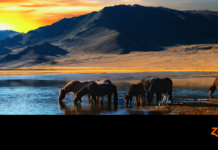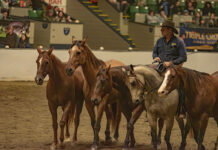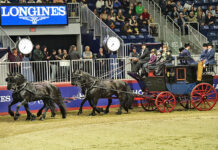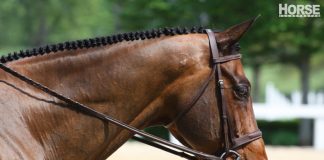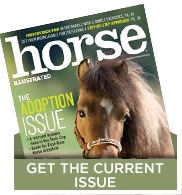
It takes a lot to intimidate Susan Oakes. The champion equestrian clears higher jumps riding sidesaddle than most riders will ever even dream of attempting with one leg on either side of their horse. Oakes currently holds the world records for sidesaddle puissance (6’8”) and triple bar (6’5”). Horse Illustrated profiled Oakes back in September 2016.
Another situation involved a man who had sold a horse to a friend of Oakes’. The friend had returned the horse, and the seller took his anger over the situation out on Oakes, not only threatening her, but doing real damage to her career in the equestrian industry by contacting managers of shows where she was judging and complaining about her.
“I went down some roads so dark that I didn’t think there would be a tomorrow,” Oakes told The Telegraph. “At night, I actually prayed that I wouldn’t wake up the next morning.”
Situations like these led to the creation of the “Not on My Yard” campaign in Great Britain. The campaign aims to raise awareness of the problem of bullying within all disciplines in the equestrian world and to build a code of conduct to prevent bullying behavior from starting at a grassroots level.
Bullying takes many different forms in and out of the horse world. It can be a trainer whose feedback crosses the line and tears riders down instead of helping them fix problems. It can be peers at a stable, in a riding club, or on the local show circuit talking negatively or spreading rumors about another rider. There have been cases where bullying has escalated to vandalism; there are reports of riders chopping off the manes or tails of another rider’s horse, either to hurt their appearance in the show ring or simply out of spite.
In some situations, low-level bullying can be resolved by having a straightforward and calm conversation about what’s happening; sometimes people don’t realize their jealousy or frustration are manifesting as bullying behavior. In other cases, a bullying victim may require outside help. The Not on My Yard campaign is one way that leaders in the horse industry hope they can stop bullying before it starts, and get riders the help they need in dealing with bad behavior from their fellow equestrians.
For more on identifying and dealing with bullying, read “Barn Bullies” in the January 2017 issue of Horse Illustrated.
Leslie Potter is a writer and photographer based in Lexington, Kentucky. www.lesliepotterphoto.com

